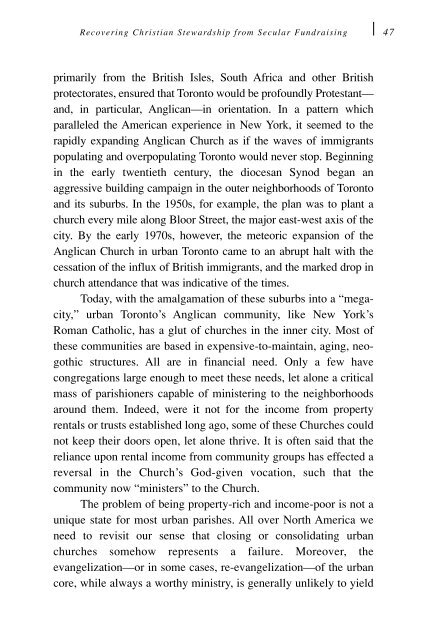Passionate Steward - 10th Anniversary Edition
10th Anniversary Edition of The Passionate Steward - Recovering Christian Stewardship from Secular Fundraising (St. Brigid Press - 2002).
10th Anniversary Edition of The Passionate Steward - Recovering Christian Stewardship from Secular Fundraising (St. Brigid Press - 2002).
Create successful ePaper yourself
Turn your PDF publications into a flip-book with our unique Google optimized e-Paper software.
Recovering Christian <strong>Steward</strong>ship from Secular Fundraising 47<br />
primarily from the British Isles, South Africa and other British<br />
protectorates, ensured that Toronto would be profoundly Protestant—<br />
and, in particular, Anglican—in orientation. In a pattern which<br />
paralleled the American experience in New York, it seemed to the<br />
rapidly expanding Anglican Church as if the waves of immigrants<br />
populating and overpopulating Toronto would never stop. Beginning<br />
in the early twentieth century, the diocesan Synod began an<br />
aggressive building campaign in the outer neighborhoods of Toronto<br />
and its suburbs. In the 1950s, for example, the plan was to plant a<br />
church every mile along Bloor Street, the major east-west axis of the<br />
city. By the early 1970s, however, the meteoric expansion of the<br />
Anglican Church in urban Toronto came to an abrupt halt with the<br />
cessation of the influx of British immigrants, and the marked drop in<br />
church attendance that was indicative of the times.<br />
Today, with the amalgamation of these suburbs into a “megacity,”<br />
urban Toronto’s Anglican community, like New York’s<br />
Roman Catholic, has a glut of churches in the inner city. Most of<br />
these communities are based in expensive-to-maintain, aging, neogothic<br />
structures. All are in financial need. Only a few have<br />
congregations large enough to meet these needs, let alone a critical<br />
mass of parishioners capable of ministering to the neighborhoods<br />
around them. Indeed, were it not for the income from property<br />
rentals or trusts established long ago, some of these Churches could<br />
not keep their doors open, let alone thrive. It is often said that the<br />
reliance upon rental income from community groups has effected a<br />
reversal in the Church’s God-given vocation, such that the<br />
community now “ministers” to the Church.<br />
The problem of being property-rich and income-poor is not a<br />
unique state for most urban parishes. All over North America we<br />
need to revisit our sense that closing or consolidating urban<br />
churches somehow represents a failure. Moreover, the<br />
evangelization—or in some cases, re-evangelization—of the urban<br />
core, while always a worthy ministry, is generally unlikely to yield




